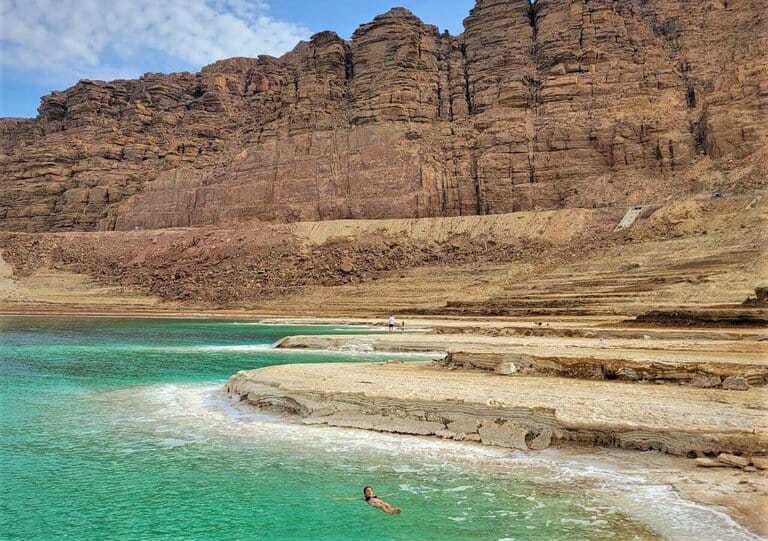Floating in the Dead Sea is a bucket list item for many people the world over. The Dead Sea is one of those places that just calls to you, a mysterious siren from the middle of the desert.
Shared between Israel and Jordan in the heart of the Middle East, the Dead Sea is arguably the most historically, geographically, and culturally significant body of water on earth. In this article you will learn all about how to visit and float in the Dead Sea on the Jordan side.
Note: this article contains affiliate links, which means that should you purchase something or get a quote through them I may make a small commission at no additional cost to you. This helps keep the site running with up to date information. I do not represent GetYourGuide, World Nomads, Booking.com, or Rentalcars.com. This is information only and not a recommendation to buy the product mentioned in this article.
Dead Sea, Jordan – What You Need to Know
Where is the Dead Sea?
The Dead Sea is located in the Middle East, half in Jordan and half in Israel and it forms the end of the Jordan River between the two countries. It’s about halfway between Amman, Jordan and Jerusalem.
The main tourist area of the Dead Sea on the Jordanian side is at the northwest corner of the lake, about a one-hour drive from Amman International Airport. From the northern tip of the Dead Sea to the southern tip on the Jordanian side it’s about 50 km, all connected by the 2-lane Jordan Valley Highway.
What is the Dead Sea?
The Dead Sea is one of the saltiest bodies of water on the planet. With a salinity of 34.2%, it’s about 10 times saltier than the ocean. It gets the name “Dead” sea from the fact that pretty much no life can sustain in the lake. It’s too salty. Only trace amounts of bacteria and microbial fungi have ever been found living in the lake.
The extreme saltiness means that pretty much everything that goes in the lake floats on the surface, including you. It’s also not actually a sea, but a lake. I guess “Dead Sea” just sounds better than “Dead Lake.”
The shores of the Dead Sea are also famous for being the lowest place on the planet. At 1412 feet (430.5m) below sea level, the Dead Sea is over 1000 feet lower than Death Valley, the lowest point in the Western Hemisphere. So while it doesn’t hold the title of saltiest lake on earth, it has the superlative for the lowest point.
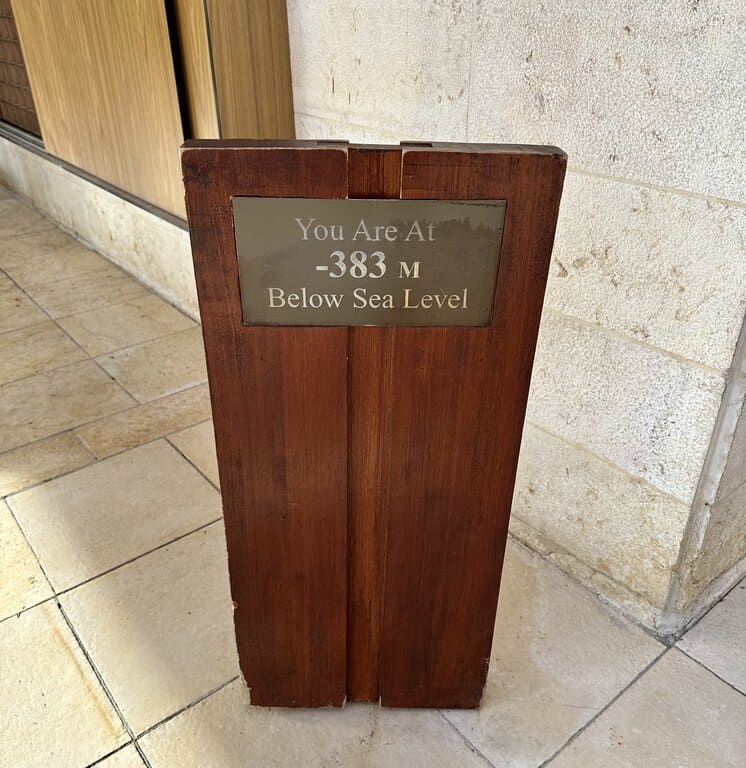
How to get to the Dead Sea
If you’re visiting the Dead Sea from the Jordanian side, you’ll most likely be flying into Amman. The best way to get to the Dead Sea is to drive yourself (see next section about driving in Jordan). For a great deal on a rental car from the Amman airport with Rentalcars.com, you can use the search bar below.
If you’re not driving yourself then there are a few other ways to get there. There are numerous organized tours from Amman that will take you to the Dead Sea for a day or a half day. This is the best option if you want everything to be taken care of and to go with an experienced guide.
If an organized tour isn’t your thing there you can hire a taxi for the day, which will probably cost you as much as a tour. Taking a one-way taxi isn’t advised, as it can be hard to find a taxi back to Amman from the Dead Sea.
There is a direct bus – the JETT – from Amman to the sea but its availability is not reliable. Be sure to check the website before considering the bus.
There are also local minibusses, which is a super Jordanian way to travel. These leave throughout the day and no prior arrangements are necessary. But they won’t take you all the way to the sea and you’ll have to book a taxi the rest of the way and thus you’re faced with the same issue of finding a taxi at the coast.
So in summary, the easiest and most affordable way to get to the Dead Sea is to have a rental car.
Why visit the Jordanian side?
Good question. As we already discussed the lake is half in Jordan and half in Israel. There are hotels and resorts on both sides. On the Israeli side, the resort area is at the south of the shoreline. It comes down to where you want to base your vacation.
If you’re going to Israel, then go to the Israeli side. If you’re not specifically going to Israel, then a road trip around Jordan, adding on famous destinations like Petra and Wadi Rum is probably a better option.
As you might have heard, Israel and its neighbors are not exactly friends. While it is possible to cross the Jordan-Israel border, as Jordan is the most amicable neighboring country to Israel, you probably want to avoid that and stay in one country or the other.
Both sides of the Dead Sea are flanked with large, brown and red mountains. The Jordanian side is just more accessible, with more public beaches, parking places, and nicer resorts.
Where to stay along the Dead Sea
All the accommodations along the Dead Sea in Jordan are at the northern end of the shore near the town of Swemeh. The central and southern shore is a protected bioreserve. Nice resorts pretty much have a monopoly on waterfront properties. There are a few other places to stay that are not on the water, but they are also not cheap, and if you’re going to pay $200 you might as well be on the water.
Best waterfront resorts to stay at on the Dead Sea:
All these resorts have private beaches along the Dead Sea. If you’re not at one of these or at one of the other waterfront properties, you’ll have to either pay for a resort day-use pass or use one of the many public beaches. When you stay at one of the resorts, you likely won’t be leaving the property while you’re there. They all have multiple restaurants and everything you need during your stay.
We stayed at the Marriott and it was wonderful. The service was top notch and the property is absolutely gorgeous. The breakfast was enormous and the heated pool was perfect on an unseasonably cold day.
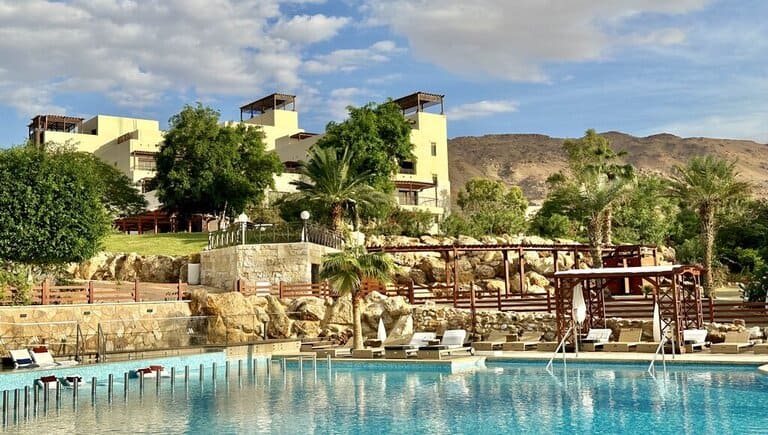
On top of the resorts there are some other non-waterfront hotels and apartments for rent in the region. You can check out the full listing of properties on booking.com here. If you are a budget traveler, you’ll have to make a day trip from Amman where accommodation prices are more affordable (or try your luck with some wild camping).
Driving in Jordan
Driving in Jordan is safe, affordable and effective. Road signs are in Arabic and English and road rules are similar to any western country. The roads are also mostly in good condition and Jordanian drivers are pretty tame. That being said, be on the lookout for a few things when driving in Jordan:
- The rental company will inspect every little teeny tiny nick on the car and their standard insurance does not cover these tiny marks and scratches.
- Speed cameras are literally everywhere, you will likely get a speeding ticket unless you are meticulous about driving under the limit.
- Stray dogs and cats are also everywhere. Please don’t hit them.
- When driving in small towns be careful because children literally walk in the middle of the road. Try not to hit the kids either.
- Gas stations are full service
Language
The language in Jordan is Arabic. As Jordan is becoming more and more of a tourist destination, English is becoming common amongst the locals. People working at hotels and resorts along the Dead Sea will speak English.
Outside of the resort area though, English will be limited. They’ll know enough to say “we are not police”, which seems to be the favorite saying of the panhandlers along the Dead Sea.
Money
The Jordanian Dinar (JOD) is the currency. Like a few other currencies, it’s pegged to the US Dollar. That means that the currency is set to a fixed value to the dollar. 1 JOD is equal to 1.41 USD and it never changes.
Jordan is still very much a cash society. If you plan on not leaving the resort area you won’t need any cash. But chances are you’ll want to get out at some point, and you’ll want to carry cash when you do. Tipping is also common in Jordan for tour guides and other services.
Outside the resorts on the Dead Sea things can be pretty cheap. But the same cannot be said in the resorts themselves. Expect to see prices more like in the US or Canada if you’re at a resort. And by that I mean compared to everyday life in the US or Canada. The resort area is still far cheaper than a similar resort in the desert in California.
PRO TIP: Some places in Jordan will try to charge you in your home currency when paying by credit card. When this is done the Jordanian government automatically adds a ridiculous 10% surcharge to the amount. Always – I repeat ALWAYS – pay in Jordanian Dinar.
Dead Sea Weather
As you might have inferred, it can get pretty damn hot at the Dead Sea. This is the lowest elevation on the planet after all and a barren desert almost completely devoid of life forms. That being said, it’s not as hot on average as Las Vegas or Phoenix, and not even close to a typical summer day in Death Valley.
Summer highs are around 95 degrees (35 C) and winter highs are around 66 (19 C). Between the seasons it varies linearly, so if you’re looking for the most comfortable experience, consider April, May, October or November.
It hardly ever rains at the Dead Sea. Only about 5 days a year does rain fall on the shores. Lucky us, we just happened to be there on a November day when it did rain.
The skies are clear just about all year round so expect plenty of sunshine. Though while the shores of the lake don’t get much rain, the mountains between the Dead Sea and Amman actually get quite a lot of rain. It’s not uncommon to be sitting on the beach with a storm brewing behind you.
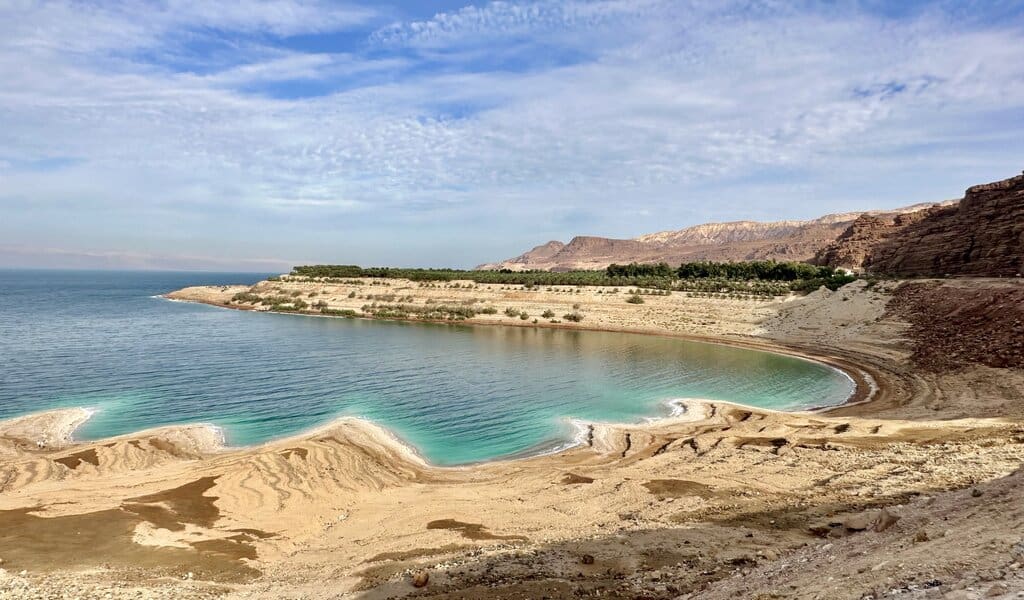
When to visit
The setup of the Dead Sea resort area and the public beaches along the coast assure that it never gets too crowded. This isn’t a small beach in Italy. So you’ll want to base your trip around the weather.
Summer might be a bit too hot, and winter can actually be too cold. If you’re going all the way there you want to float and swim in the Dead Sea without worrying about being chilly when you get out.
We went in late November and found it a bit too chilly. It was still comfortable to sit out on the beach when the sun was out. but if the sun went behind a cloud it was a bit too cold to enjoy laying out on the beach. I recommend any time in Spring or between September and early November to visit the Dead Sea in Jordan.
How long to stay
How long to stay at the Dead Sea depends on what type of traveler you are. Do you want to get spa treatments and relax at the resort for days on end? Then you can spend an entire week at the Dead Sea. Prefer to just scratch the surface and take a quick dip just to say you’ve floated in the Dead Sea? You can do that too.
Most people spend one to two nights at the Dead Sea. This is ideal for getting in relaxation, some floats, and seeing some of the natural wonders in the mountains along the coast.
Food
Jordanian food is not quite as well known internationally as other Middle Eastern cuisines. It’s quite similar to Lebanese and Syrian but it has its own uniqueness. Unfortunately, outside of the cities of Amman and Aqaba the food in Jordan is nothing to really remember.
At the resorts, the restaurants feature various cuisines, with a distinct lack of Jordanian food. So if you’re really looking for some local cuisine, the Dead Sea is not the place to be.
Alcohol in Jordan
While Jordan may be one of the most liberal Islamic nations, it’s still pretty conservative by western standards. Along the Dead Sea, alcohol is only available at the resorts and it’s really, really expensive. Like $15 for a Budweiser – after tax and service charge – expensive.
There are also no shops to buy a 6-pack or a bottle of wine, so if you want some libations to enjoy in your room, pick them up in Amman before leaving the city or be prepared to spend a paycheck on it. For more information, refer to my specific article about alcohol in Jordan.
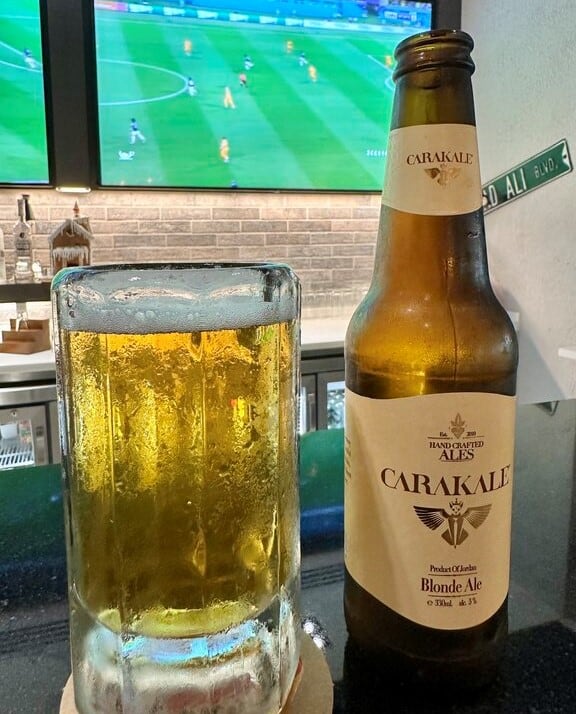
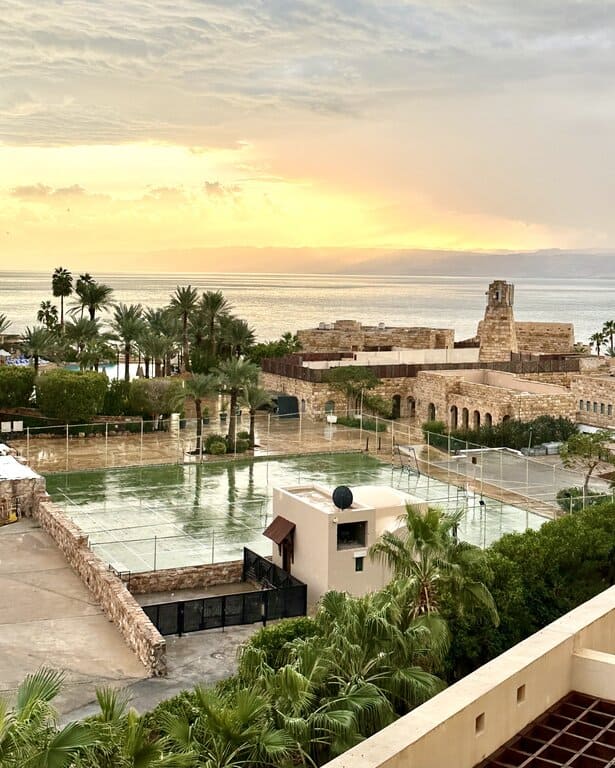
Travel Insurance
When visiting Jordan you really want to have a quality travel insurance policy. We use World Nomads when we travel. World Nomads provides coverage for travelers in over 100 countries. You can find a great policy on World Nomads by using the link below.
Quick Dead Sea Science Lesson
Before we get into where to go to float in the Dead Sea let’s first talk a little bit about why you float in its salty waters and why nothing can live in it (and other similar salty bodies of water).
Why do you float in the Dead Sea?
The basic science behind why you float in the Dead Sea and other extremely salty bodies of water is that salt water is denser than fresh water. In layman’s terms: it weighs more. Salt is heavier than water.
When salt is dissolved in water, it adds to the mass of the water without affecting the volume. Fresh water weighs 62.4 pounds per cubic foot (997 kg/m3) whereas Dead Sea water weighs about 78 pounds per cubic foot.
The density changes the buoyancy and makes you float in the Dead Sea. Humans and other animals are not much more dense than fresh water, so in water 25% more dense than normal water we simply float since we are less dense. Not everything is less dense than Dead Sea water though. Things like rocks and steel will sink right down to the bottom. Isn’t science fun?
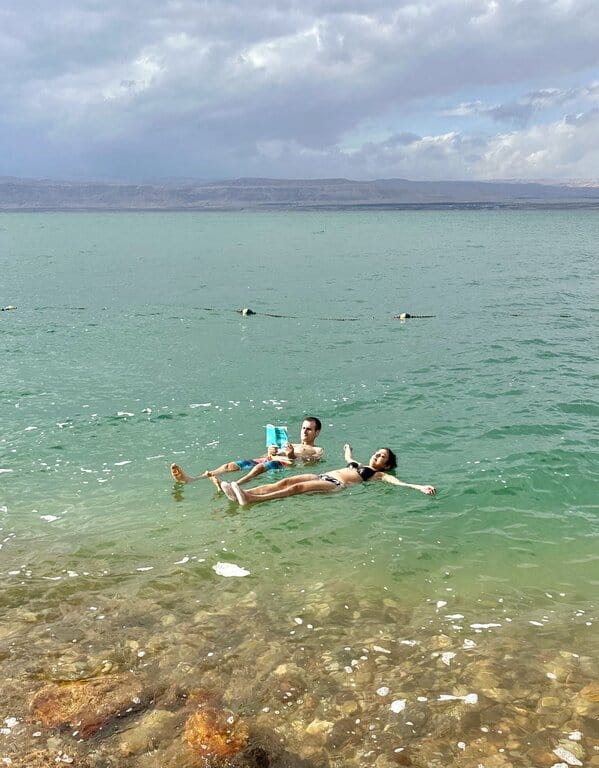
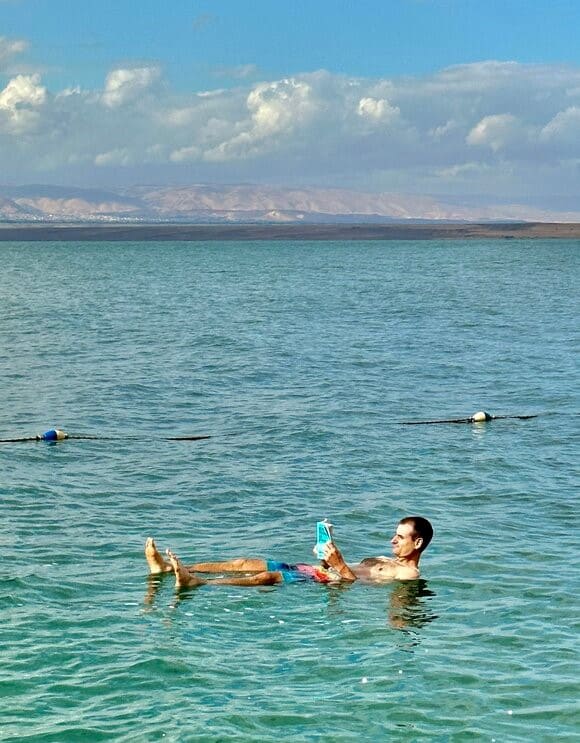
Why nothing can survive in the Dead Sea
The Dead Sea sustains almost no life at all. Only tiny microorganisms have been known to survive in the extreme salinity. The simple answer is that nothing can survive in the Dead Sea as it is just too salty.
Salt dehydrates living creatures (including you) and the saltier a lake is, the tougher it is for the body to flush out the salt. While millions of creatures call the oceans home, the salinity of the Dead Sea is simply too high for any fish or reptile or other creature to expel the salt.
Why is the Dead Sea so salty?
The Dead Sea is so salty mainly because the environment is so hot and dry and it has no outlet to the ocean. Water evaporates faster in hotter weather and there is nowhere for all the minerals in the water to drain to.
The deeper you go in the Dead Sea, the saltier the water gets, until you get to the bottom where there is just built-up salt. This is why the surface of the Dead Sea is just salt. If you’ve ever been to the Atacama Desert or the high desert in Bolivia it’s the same phenomenon.
Locations Where You Can Float in the Dead Sea
There are basically two types of places you can float in the Dead Sea in Jordan: at a private hotel beach, or at a public beach. Though I suppose you could also get dropped out of a helicopter and see how fast you rise to the surface.
The beaches themselves are not going to trick you into thinking you’re in the Maldives or anything. The shoreline is overall pretty grimy, with lots of rocks and a ton of salt. The earth’s surface here at the Dead Sea is literally just salt. If you see sand – like at the private beaches – it was brought in for your comfort.
Private beaches
There are numerous private beaches along the Jordanian coast of the Dead Sea and they all belong to hotels or resorts (except one). You can visit these beaches, however, if you purchase a day pass from a resort. No prior arrangements are needed and you can just show up and ask for a day-use pass. This will not only allow you access to the private beach, but also to the pools and other facilities at the resort.
Prices for the day passes vary by hotel. But start from about 20 JOD at the Dead Sea Spa Resort to over 100 JOD at the Kempinski Hotel. The Hilton is a good option for a day pass in the mid-range, at about 35 JOD per person.
The private beaches give you the accessibility of having clean fresh water showers at the beach and beach recliners that you can use without having to pay a fee. No alcohol is allowed at the beach (at least at the Marriott) but you’re not far from the pool bars for when you’re thirsty.
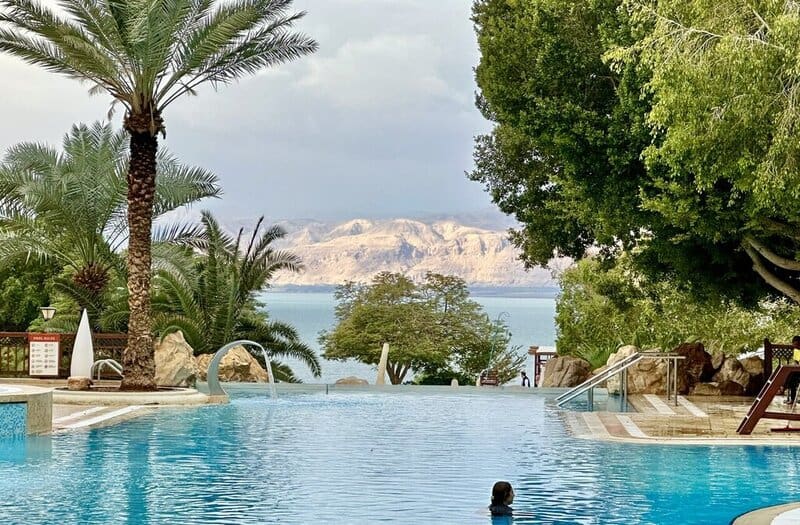
If you don’t want to visit a resort then you might want to consider Amman Beach – Dead Sea. The beach is massive and can accommodate a significant amount of people. It even has a bar, restaurant, and a pool. Unfortunately, most visitors say it’s a rip off at 20 JOD and the facilities are dirty and outdated.
Our experience at the Marriott’s private beach was that it was not a large beach, but the soft sand made it slightly more comfortable getting in and out of the water than some of the public beaches we visited.
Public beaches (free beaches)
The Dead Sea has a few public beaches along the coast that are free to access. The catch with this is that these beaches are pretty much just salty patches of earth with some parking on the side of the road.
There are no facilities other than some locals with a tank of water they will charge you to shower with. You need it though, as you don’t want to be covered in salt water all day. BYO everything.
But if you don’t want to pay to float in the Dead Sea, then a public beach is your best bet. You’ll really need a rental car though, as I wouldn’t count on finding a taxi along the Jordan Valley Highway.
Most of the coastline is pretty steep, so it’s not possible to just stop anywhere and go in the sea. It’s just too dangerous. Here I’ll link you to a Google Map location for each of the free public beaches at the Dead Sea. These are all towards the southern end of the Dead Sea, about a 30 minute drive from the resort area.
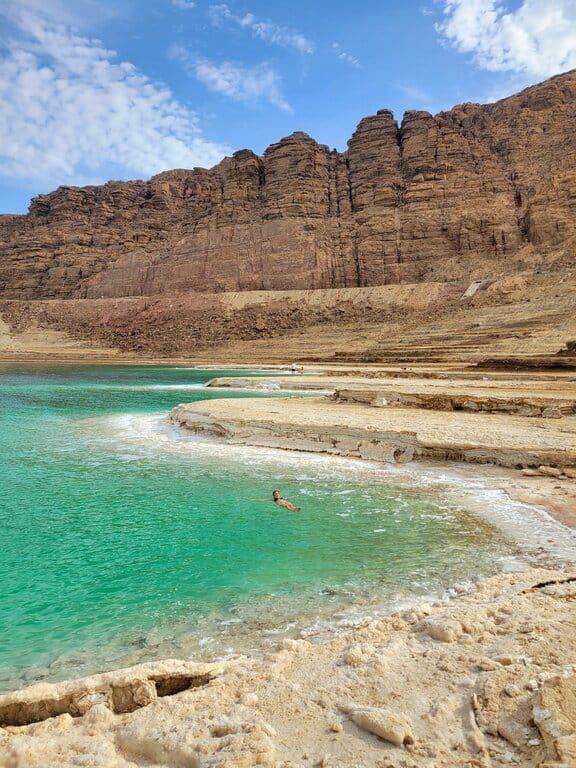
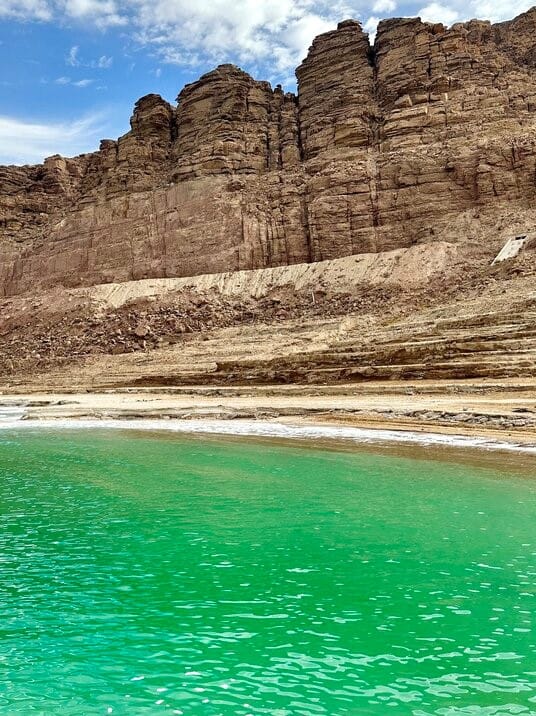
One thing I will say is that these public beaches are far more beautiful spots than the resorts though. The way the white salt crystals form the shoreline is quite a sight to behold. If you’re mostly interested in amazing photos of the Dead Sea, you’ll want to go to a public beach.
- Dead Sea Public Beach Spot 1: This is the largest of the public beaches and has plenty of parking. Locals will tell you “free shower” but they’ll want a tip.
- Dead Sea Public Beach Spot 2: Possibly the most beautiful salt formations on the coast. You can get some stunning photos from here.
- Dead Sea Public Beach Spot 3: Similar to spot #1 but with a much smaller parking area.
- Dead Sea Public Beach Spot 4: Another spot with gorgeous white salt on the shore.
The Dos and Don’ts About Floating in the Dead Sea
Now that you know where to go to float in the Dead Sea you need to know a few basics first. Let’s go through those here.
Showers are necessary after being in the Dead Sea
You know how you feel like taking a shower before doing anything after swimming in the ocean? Well imagine feeling 10 times saltier than that. The Dead Sea water leaves a salty residue on your skin that you’ll be desperate to wash off.
There is no law that says you absolutely have to rinse off after a swim in the Dead Sea, but it’s in your best interest. While the salt can be good for your skin in short durations, you don’t want it on you all day dehydrating your body.
All the private and paid beaches have fresh water showers and the free public beaches have basic showers that locals operate with tanks that they refill when needed. If you’re unable to find a shower you might want to consider rinsing off with some bottled water.
How long to stay in the Dead Sea at once
You usually don’t want to spend more than about 10 minutes in the Dead Sea at once, 15-20 minutes tops. The reason for this is because the amount of salt in the water can severely dehydrate you (probably another reason they don’t allow alcohol at the beaches). Be sure to drink plenty of water if you’re going in and out of the water.
Cuts and scratches
If you have any cuts, scratches, or other open wounds, floating in the Dead Sea can be a painful experience. The salt concentration will burn those wounds.
The local hotels recommend you don’t even shave a day or so before going into the Dead Sea just in case you nick yourself with the razor. If you’ve come all this way and don’t want to miss out on floating in the Dead Sea because of a cut or scratch, just be prepared for the pain.
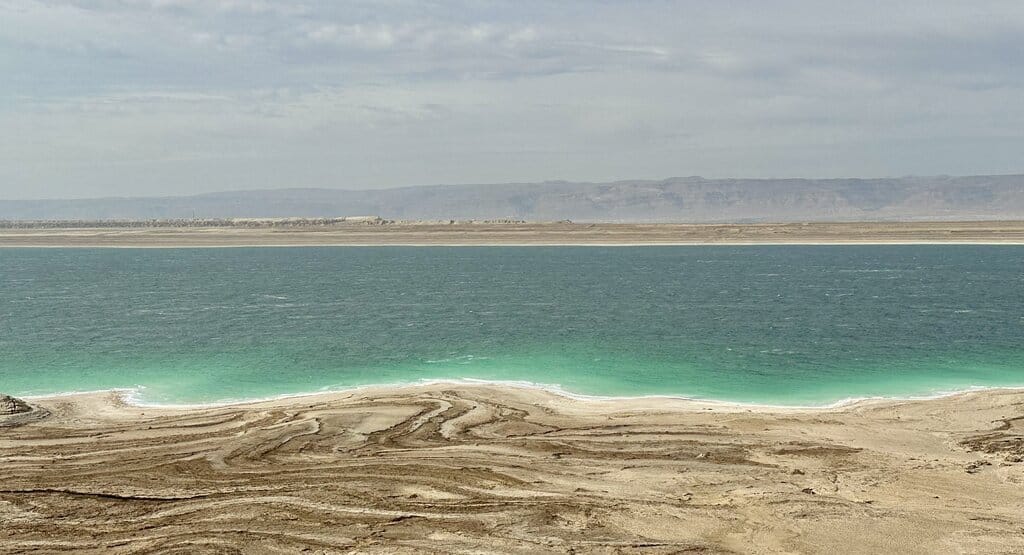
Is it safe to float in the Dead Sea?
It’s totally safe to float in the Dead Sea. So long as you follow the basic guidelines mentioned above, you will have a great experience. You can’t drown in the water and there are no dangerous creatures swimming around. Just don’t stay in for too long and be sure to rinse off afterwards.
Swimming in the Dead Sea
You can swim in the Dead Sea as much as your heart desires. Just do your best not to get any of the water in your face or hair. This might be difficult if you’re swimming, so maybe a pleasant breast stroke would be best.
It’s advised not to get the Dead Sea water in your face since it can easily get in your mouth. Not only does it taste awful, but drinking the water directly will dehydrate you considerably faster than your body absorbing the salt through your skin.
It’s advised not to get the water in your hair either, as – you guessed it – it will dehydrate your hair and can damage it. If you have sensitive hair you’ll want to get to your room for a shampoo as soon as you can if your hair gets wet in the sea.
Health benefits of Dead Sea mud
Mud from the depths of the Dead Sea is famous for nourishing and hydrating your skin. Covering your entire body in Dead Sea mud is almost a rite of passage when visiting the Dead Sea. The mud is said to have numerous benefits, such as:
- Moistens and helps remove dead skin
- Helps relieve acne
- Can provide arthritis relief
- Can reduce wrinkles and relieve skin imperfections
- Improves circulation
There are various other benefits of the mud, and it’s unlikely you’re going to see much relief from just one mud bath. But why not go for it while you’re here?
The resorts all have collections of the mud that you can apply to yourself or have one of the workers apply to you. At public beaches you’ll have to scrounge for mud yourself from the bottom of the sea, which is probably more effort than it’s worth.
To apply the mud, just rub it on your skin, including your face, right after you come out of the sea. Don’t dry off first. Let the mud sink in and dry for about 15 minutes and then head back into the water where the mud will dissolve off of you.
Photo tip: get a newspaper or book
Perhaps the most famous photo of the Dead Sea is the classic photo of someone floating on their back reading a newspaper. You can get yourself a similar photo by grabbing a newspaper from your hotel or a market and keeping it out of the water long enough to get some photos.
You can also use a book, which also produces some neat photos. Just be aware that you will likely drop the book into the water and it will be ruined. So finish that book first!
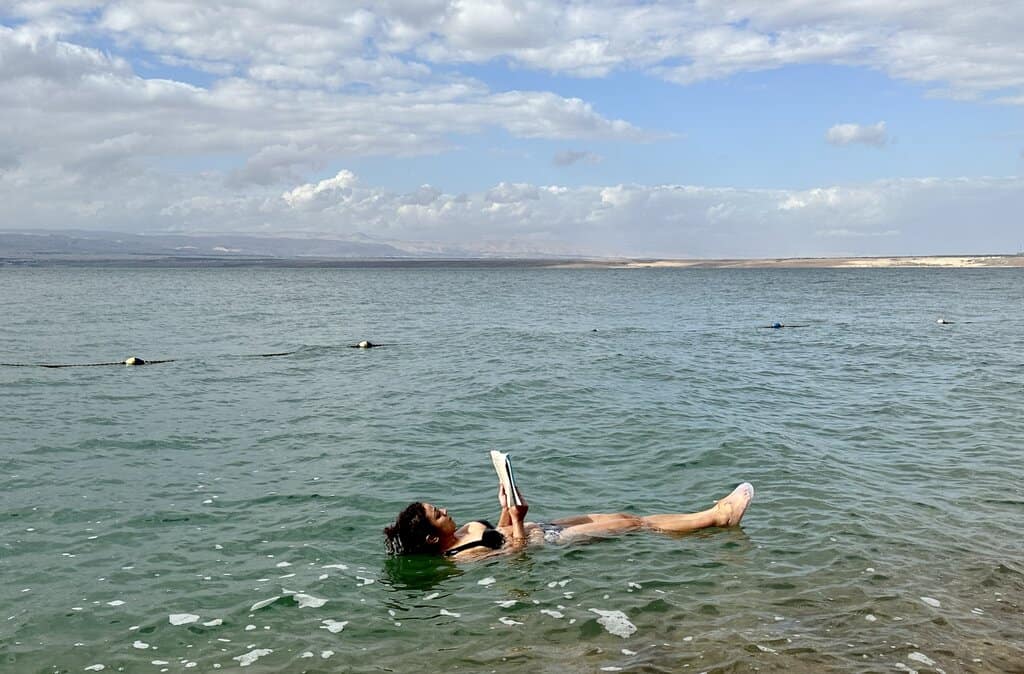
Other Fun Activities at the Dead Sea
There is more to do at the Dead Sea in Jordan than just float on your back and relax at resorts. The desert mountains that flank the sea are remarkably beautiful and feature some stunning canyons and viewpoints. If you can fit it into your schedule, allow for some time to explore the sandstone mountains that rise out of the sea.
Hiking
This part of Jordan looks eerily similar to southern Utah, though you won’t find quite as many hiking trails. The best hikes are concentrated in the Wadi Mujib Biosphere Reserve, which protects a large canyon and narrow river that flows into the Dead Sea.
Unfortunately the Jordanian government requires you to go with a local guide for all but one of these hikes and none of them are free. You can book the hikes at the Mujib Adventure Center, which is basically the visitors center for the park.
The most famous hike in the region – and arguably the most famous in all of Jordan – is the Wadi Mujib Siq Trail. This beautiful hike takes you through a narrow slot canyon that is full of water year-round. In fact, it’s closed from November 1 – March 31 because the water is too high to safely pass in those months.
In the other months you’ll have to wade through water up to your chest to complete the hike. But don’t be scared, it’s totally worth it. Everyone that has done the hike agrees that it’s stunning and probably the best hike in Jordan.
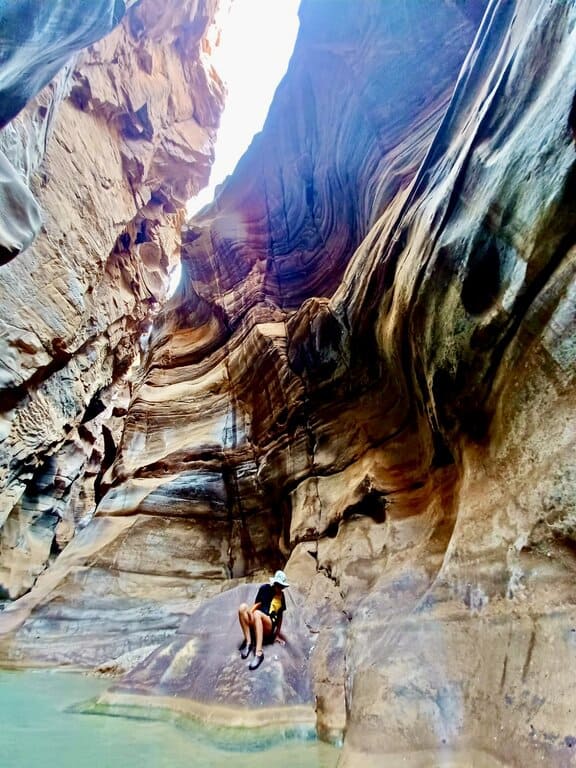
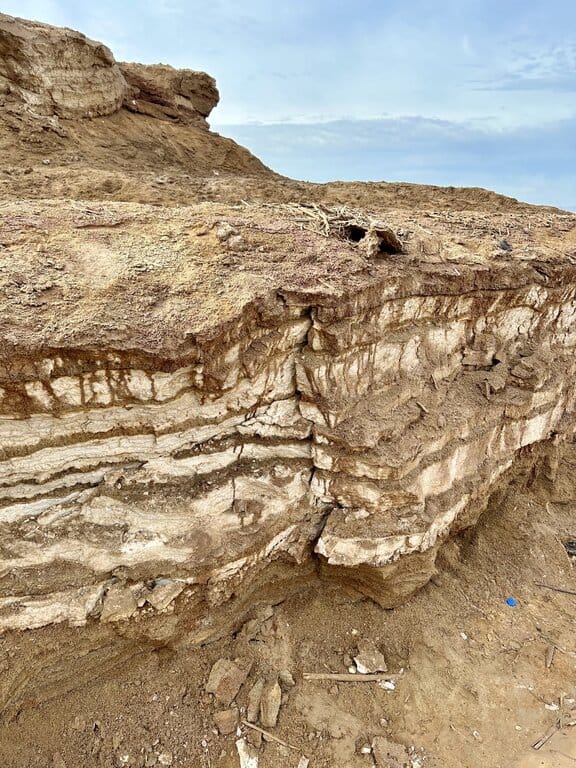
The other hikes in the reserve are the Ibex Trail, the Maliqi Trail, and the Canyon Trail. These trails get deeper into the canyon and offer some breathtaking views. Each of these require a guide, however, and can run up to 80 JOD per person.
In my mind it’s a complete rip off, which is why hardly anyone does these hikes. Of these, the Ibex Trail is the only trail open between Nov – March.
Hot springs
Ma’in Hot Springs is an area of natural hot springs and thermal waterfalls about 30 minutes southeast of the Dead Sea resorts. It’s a little oasis in the desert that you can visit without staying at one of the resorts on the site.
The hot springs – including 4 waterfalls – are open to the public daily from 9:00-21:00 for 15 JOD. Nestled between towering mountains and flanked by beautiful palms, the hot springs is one of the most spectacular places in Jordan.
Other points of interest
Panorama Dead Sea Complex: You can find the best view of the Dead Sea from the Panorama Dead Sea Complex, which contains a museum dedicated to the Dead Sea, a panoramic view restaurant, and a short canyon rim hiking trail.
The Babtismal Site of Jesus Christ: Pretty self-explanatory. The Babtismal Site of Jesus Christ is 12 JOD to visit. It’s basically just a church, but obviously with supreme biblical and historical significance.
Mount Nebo: Mount Nebo is a desert peak mentioned in the Bible as the place where Moses was shown the sacred Promised land just before his death. It’s set up for tourists these days and features the Church of Moses and an informational museum (only 3 JOD to visit).
Final Word – Floating in the Dead Sea
Floating in the Dead Sea is a once-in-a-lifetime experience that is an absolute necessity on any trip to Jordan. Whether you’re staying at a 5-star resort, or just stopping by one of the salt-crusted public beaches, you’ll cherish your Dead Sea memories for years to come. And with the beautiful desert mountains and slot canyons all around, you’ll never want to leave!

